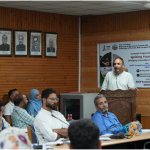Diwali, the festival of lights, is celebrated with great fervor and enthusiasm by millions of people worldwide. It is a time of joy, family gatherings, and the exchange of sweets and gifts. However, beneath the glittering lights and colorful decorations lies a profound message that has endured through the ages. In a world where humanity faces the gravest threat from the declining values, the message of Diwali holds more significance than ever. This literary exploration delves into the timeless wisdom that Diwali imparts and its relevance in our contemporary society.
Diwali, derived from the Sanskrit word “Deepavali,” means a row of lights. At its core, Diwali signifies the victory of light over darkness, good over evil and knowledge over ignorance. It celebrates the return of Lord Rama to Ayodhya after his triumph over the demon king Ravana, symbolizing the conquest of righteousness over wickedness. The lighting of lamps and candles during Diwali represents the dispelling of ignorance and the illumination of the mind with wisdom.
In today’s world, humanity faces multifaceted challenges, and one of the most prominent is the erosion of values. The rapid pace of modernization, materialism, and the relentless pursuit of success often overshadow fundamental values such as compassion, empathy, integrity, and moral uprightness. The increasing incidents of violence, intolerance, corruption, and environmental degradation stand as grim reminders of the declining ethical standards.
Amid these challenges, the message of Diwali becomes even more relevant. It reminds us that the path to goodness and enlightenment is not devoid of obstacles but is achievable through determination and unwavering faith. The celebration of Diwali encourages us to reflect on the following aspects:
Diwali teaches us that the victory of good over evil is possible, even in the face of adversity. In our contemporary society, where moral and ethical dilemmas are prevalent, Diwali inspires us to stand firm in our principles and values.
The festival emphasizes the importance of knowledge and wisdom in dispelling ignorance. In a world where misinformation and ignorance can have severe consequences, the pursuit of knowledge is essential for the betterment of society.
Diwali brings families and communities together. In a time when divisions and conflicts are rampant, this festival encourages us to strengthen our bonds, foster unity, and build a harmonious society Diwali is also a time for giving and sharing. It prompts us to extend a helping hand to those in need, fostering a spirit of compassion and charity, which is crucial in addressing the challenges of poverty and inequality.
While the message of Diwali remains significant, it is essential to actively revive and practice these values. It starts with self-awareness and a commitment to personal growth. Moreover, education and awareness campaigns can play a vital role in instilling values from a young age. Religious and community organizations can organize events and initiatives that promote moral and ethical values, reinforcing the message of Diwali.
Diwali’s core message is the triumph of good over evil, symbolized by the victory of Lord Rama over the demon king Ravana. In our modern world, the battle between good and evil is not as straightforward as the ancient epics, but it is no less significant. We face moral dilemmas, ethical quandaries, and the constant pull between self-interest and the greater good. The festival of Diwali serves as a reminder that even in the face of complex challenges, the victory of goodness and righteousness is not unattainable.
Today’s society grapples with issues such as corruption, discrimination, and social injustices. Diwali teaches us that while the path towards a more just and equitable world may be arduous, it is a path worth treading. Individuals and communities can draw inspiration from the ancient saga of Rama and strive to overcome the forces of injustice and immorality.
The lighting of lamps and candles during Diwali signifies the dispelling of ignorance and the illumination of the mind with wisdom. In the digital age, the need for knowledge and wisdom is more critical than ever. Misinformation and ignorance can lead to dire consequences, and the pursuit of truth and understanding is vital to combat these challenges.
The festival encourages us to be seekers of knowledge, to continuously educate ourselves, and to share knowledge with others. In a world where the rapid spread of information can be a double-edged sword, Diwali emphasizes the responsibility of using knowledge to uplift society and promote a more enlightened, well-informed citizenry.
Diwali is a time for families to come together, celebrate, and strengthen their bonds. In contemporary society, divisions and conflicts often dominate the headlines. Ethnic, religious, and political differences can create rifts in communities and nations. Diwali underscores the importance of unity and the power of shared celebrations and traditions to bridge divides.
As we gather with our families and communities during Diwali, we are reminded of the importance of coming together, irrespective of our differences. This sense of unity fosters an environment where cooperation and understanding can flourish. It is a gentle nudge to put aside our disagreements and work towards common goals, for a harmonious society is built upon the foundation of unity and shared values.
Diwali is a time for giving and sharing. It encourages us to extend a helping hand to those in need, fostering a spirit of compassion and charity. In the present world, where poverty and inequality persist, the importance of reaching out to those less fortunate cannot be overstated.
The festival inspires us to open our hearts and wallets to support those facing adversity. Acts of charity and kindness not only alleviate the suffering of others but also reinforce the values of empathy and compassion. The revival of these values is essential to address pressing global issues, such as poverty, hunger, and homelessness. Diwali serves as a yearly reminder of our responsibility to contribute to the betterment of society.
While the message of Diwali remains significant, it requires active efforts to revive and practice these values. The revival starts with self-awareness and a commitment to personal growth. It involves introspection and the conscious choice to align our actions with the values celebrated during Diwali. It means making a deliberate effort to be more compassionate, understanding, and ethical in our daily lives.
Moreover, education plays a pivotal role in instilling values from a young age. Schools, colleges, and educational institutions should incorporate moral and ethical education into their curriculum. This would help in developing well-rounded individuals who not only excel academically but also carry a strong moral compass.
Religious and community organizations can also play a vital role in organizing events and initiatives that promote moral and ethical values. These gatherings can serve as platforms for discussing contemporary challenges, sharing experiences, and reinforcing the timeless message of Diwali.
In conclusion, Diwali’s enduring message of light, goodness, knowledge, unity, and compassion remains profoundly relevant in the face of declining values in contemporary society. This festival serves as an annual reminder of the potential for positive change and renewal, reminding us that even in the darkest of times, the light of hope and virtue can guide us towards a more enlightened and virtuous world. As we celebrate Diwali, let us not only light lamps but also kindle the light of compassion, wisdom, and goodness in our hearts, paving the way for a brighter, more virtuous future.
(Author can be reached at: [email protected])








